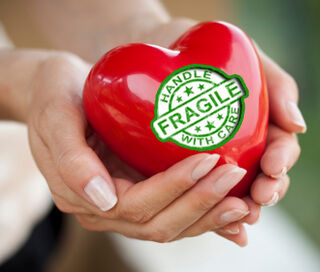Relationships
Hooked on Messy Loving
Why toxic relationships are addictive.
Posted February 4, 2014 Reviewed by Ekua Hagan

We have all witnessed it, and most of us have experienced it. A person treats a person really well, and lovingly, and then… boom! They do something extremely abusive to the person.
Healthy people do not tolerate that and they usually move on after it occurs a few times. Unhealthy people usually rationalize the behavior. Yes, he forgets my birthday, but he takes me on great weekend getaways sometimes.
If someone does something nice for you, is he or she entitled to abuse you? The answer is no. Yet, more often than not, that is exactly what happens in many toxic platonic, professional, familial, and romantic relationships. Many of us, with ailing self-esteem, allow people to abuse us because they have been nice to us. Why is that? There are two reasons.
From birth, the human brain’s mission is to wire itself to best provide the highest quality of life possible. To achieve this end, the developing brain takes cues from our early environment to determine “how the world should be” and wires itself accordingly to survive in that world. This is why adults who grow up in unstable environments always expect the bottom to fall out when things are going well. When they were kids and things were going well, the bottom always fell out.

Likewise, people growing up with parents who were very exceptionally loving sometimes and extremely abusive other times believe that that is how the world is supposed to be. Thus, the mindset is: if you are nice to me, you are allowed to hurt me.
“I thought you said the brain’s job is to make life as good as possible for the individual?” you ask. Not exactly, I said the brain’s job is to make life as good as possible for the individual in his or her world, according to how the brain perceives that world to be. “How the brain perceives the world to be” is the operative phrase. Thus, that is one part of the puzzle.
The other part of the puzzle involves variable reinforcement, which the reward center of the brain absolutely loves. For clarity, we need to understand the difference between variable and fixed reinforcement. Fixed reinforcement means if you do X you get Y, and thus, do 2X and get 2Y. In a romantic relationship that would translate into the following: Take a date to McDonald’s and get to first base. Take a date to Red Lobster and get to second base. Take a date to a five-star restaurant and you get to be dessert. However, if a person knows exactly what he or she needs to do to get what they want, then they can calculate it mentally. Fixed reinforcement leads to reasonable behavior because the rules are clear.
Conversely, variable reinforcement, which gives somewhat random rewards to specific behaviors, is a strong trigger for addiction and makes relationships with toxic dynamics attractive. With variable reinforcement, the reward is not commensurate to the amount of work done. This is similar to gambling. Put ten dollars on the craps table, and sometimes you will lose it, and other times you will win big. Not knowing when the big wins will come makes the relationship much more exciting and it generates adrenaline.
So if a romantic partner acts loving at times and at other times is withdrawn and distant, the other romantic partner will begin to lust after him or her, and not necessarily sexually. More often, psychological and emotional lust for attention and validation drives toxic relationship dependency than sexual lust.
In the brain, dopamine (the brain’s happy-dance drug) responds to lust. Dopamine encodes on the anticipation of reward. Like the compulsive gambler anticipating the big pay-off, the toxic relationship addict is waiting for the jackpot of love and affection from the other person. Not knowing whether that is going to happen or not causes adrenaline release.
Adrenaline is a stimulant. Stimulants are addictive. In terms of neurochemicals, you can think of dopamine as straight whiskey, adrenaline as beer, and the brain as a boozehound. If it had to choose, the brain would choose dopamine over adrenaline all day, every day. If given the choice though, the brain loves nothing more than a shot of dopamine with an adrenaline back.
It is the synergy among availability, chance, and lust. The less available something is, the less chance we have of finding it, the more precious it becomes, and the more we lust after it. That is why one rock is a jewel and another rock is a stone.
Obviously, the brain’s love for a shot of dopamine with an adrenaline back is not a life sentence to toxic relationships, since most people do not do this. The reason most people do not do this is input from the pre-frontal cortex. The dopamine/adrenaline scenario involved in addictive unhealthy relationships occurs at a subcortical level in the brain, or in the old mammal, non-thinking, emotional part of the brain. The cortex, or thinking part of the brain, can influence subcortical structures. However, that is dependent on serotonin availability. In compulsive sorts, serotonin is usually not available. In addition, if you are distracted by stress, serotonin is not available to influence this behavior.
The resounding question is: How do you escape this? Like all things human, it is about learning and awareness. You have to be aware that toxic relationships are appealing because that is what you know. That is what your brain expects from the world based on your early experiences.

You may have been born an emotional refugee but you do not have to be an emotional refugee for your entire life. Know that toxic relationships utilize dopamine and adrenaline and those neurochemicals are addictive and predispose humans to addiction and the destructive consequences of addiction.
Like any addiction there is one ultimate solution—find a way to let it go. Toxic relationship addiction is like any other master/slave relationship. It is not the master who sets the slave free; it is the slave who lets the master go. You have to stop chasing the big emotional payoff in relationships that can only provide it mercurially. It is a gambler’s game. As a crap shooting man’s son, I can tell you, the trick in winning at craps is never making a bet that you cannot afford to lose. No one can ever afford to lose his or her heart, spirit, or dignity. Remain fabulous and phenomenal.




